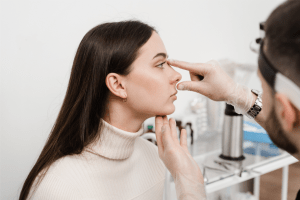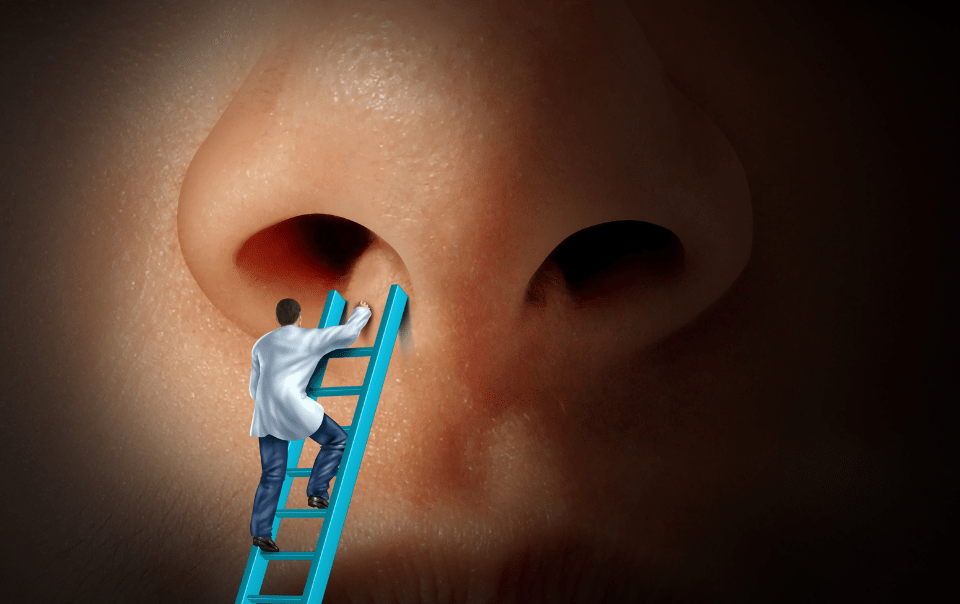Sinus infections affect millions of people every year, with allergy season aggravating them even more. Thankfully, there are a variety of surgical sinus procedures that provide permanent relief. However, how do you know which one is right for you? Keep reading to find out more about the different types of sinus surgery so you can choose the best one.
- What Is Sinus Surgery?
- Signs You Need Sinus Surgery
- Types of Sinus Surgery
What Is Sinus Surgery?
Sinus surgery is a collection of surgical procedures that ENT specialists use to relieve your ongoing sinus infections. You may have some abnormal tissue growth in your nasal airways that does not respond positively to traditional remedies or treatments. Normally, these solutions are the first line of defense against sinus infections. However, they may not be as effective since they don’t treat the cause. Sinus surgery is the most effective solution to improve your breathing and prevent sinus infections.
Signs You Need Sinus Surgery
There are certain recurring conditions that require surgical treatment. For instance, if you suffer from sinusitis, where your nasal passages and sinuses become swollen and infected, you may experience the following symptoms:
- Stuffy nose
- Constant pressure in your nose, eyes, and forehead
- Coughing
- Nasal drainage
- Headaches
- Sore throat
- Fullness in the ears
- Snoring
- Restless sleep
- Decreased smell or taste
You may also need sinus surgery if you have nasal polyps. Nasal polyps are soft, noncancerous growths on the lining of the nose or sinuses. They are often a side effect of chronic rhinosinusitis, which is an inflammation of the nasal passages and sinuses. Nasal polyps are common, especially in people with asthma, allergies, or a history of polyps.
It’s also possible to have a deviated septum blocking one side of your nose. A deviated septum is a condition in which the nasal septum (the piece of cartilage that divides the nasal cavity into two halves) is displaced to one side. This makes one nostril smaller than the other and can ca1use difficulty breathing through the nose. The septum is made of cartilage and bone. The septum helps to filter the air that we breathe and keeps the nasal passages open.
A deviated septum can also be caused by several things, including:
- Birth defects
- Injury to the nose
- Infection
- Allergies
If you have a deviated septum, you may experience:
- Difficulty breathing through the nose
- Nasal congestion
- Nosebleeds
- Facial pain
- Postnasal drip
If you have any of these symptoms, it is important to see a doctor. A deviated septum can be treated with surgery or medication. The only way to permanently treat a deviated septum is with sinus surgery.
Hypertrophied turbinates develop when the two bony structures that are located inside the nose become enlarged. These structures help to warm and humidify the air before it enters the lungs. They can block the nasal passages and cause many problems, including:
- Nasal congestion
- Difficulty breathing through the nose
- Postnasal drip
- Facial pain
- Headaches
- Nosebleeds
In some cases, hypertrophied turbinates can also cause sleep apnea, a condition in which breathing is interrupted during sleep. There are several things that can cause hypertrophied turbinates, including:
- Allergies
- Sinus infections
- Cocaine use
- Smoking
If you have hypertrophied turbinates, your doctor may recommend a number of treatments, including:
- Medications
- Surgery
- Home remedies
Medications can help to reduce inflammation and swelling in the turbinates. Surgery can remove the enlarged turbinates. Home remedies, such as using a humidifier, drinking warm liquids, and using saline nasal spray, can also help to relieve the symptoms of hypertrophied turbinates.
Types of Sinus Surgery
There are various types of surgical procedures to treat sinus-related conditions. Here at Southern California Sinus Institute, Dr. Alen N. Cohen offers a variety of sinus surgical procedures. He is an award-winning surgeon with over 10 years of experience in nasal and sinus disorders.
Here are some of the sinus procedures he offers:
Septoplasty

During this procedure, Dr. Cohen straightens the septum to allow proper airflow. Septoplasty is an outpatient procedure that normally takes less than an hour to complete. Afterward, patients wear a cast for a week as they recover.
Balloon Sinuplasty
Millions of individuals around the world suffer from sinusitis. This condition occurs when your paranasal sinuses become inflamed due to nasal polyps, allergies, bacterial and fungal infections, autoimmune diseases, etc. Sinusitis can cause terrible headaches, facial pain, and other debilitating symptoms. However, Dr. Cohen can provide relief with Balloon Sinuplasty. This procedure takes place in-office under local anesthesia. There is minimal downtime after the surgery. Most patients can safely resume their daily activities within 24-48 hours.
Dr. Cohen inserts a small balloon in the nostrils and inflates them to widen the narrow passages. This procedure permanently enlarges the airways to reduce the occurrence of sinusitis. In some cases, Dr. Cohen may combine Balloon Sinuplasty with in-office Turbinate reduction or another procedure to improve your breathing.
Turbinate Reduction
There are three turbinates in your nose that are responsible for filtering, humidifying, and warming the air you breathe. From time to time, these turbinates swell due to inflammation, infections, allergies, and other irritants. As a result, you may produce too much mucus which affects your breathing. Dr. Cohen performs turbinate reductions to reduce the swelling and improve your breathing. Turbinate reduction takes place under local anesthesia since it is a minimally invasive procedure. Dr. Cohen uses a variety of methods to shrink inflamed turbinates, such as electrical cauterization, coblation-assisted reduction, laser treatment, and microdebrider-assisted reduction. As your turbinates heal, they will shrink, causing fewer infections.
Polypectomy
Nose and sinus polyps can affect your breathing, and sense of taste, and often cause severe sinus infections. These polyps may be the result of allergies and other irritants in the air. Steroid nasal sprays, antihistamines, and other medications only offer short-term results. Dr. Cohen can effectively remove your nasal polyps with an in-office polypectomy procedure. He uses a microdebrider and an endoscope to treat sinus and nose polyps. He is one of the only surgeons in the country to perform this procedure in-office with local anesthesia.
For Severe Sinus Infections – Endoscopic Sinus Surgery
Sinus infections often lead to constant pain, pressure, and discomfort. There are many traditional treatments, but they don’t target the source of the problem. Dr. Cohen offers in-office endoscopic sinus surgery. Not only is this procedure ideal for recurring sinus infections, but it also corrects a deviated septum and removes nasal polyps.
Dr. Cohen is part of the team that created Minimally Invasive Image Guided Endoscopic Sinus Surgery (MIGSS™). This advanced outpatient procedure targets nasal and sinus problems without incisions. Dr. Cohen uses an endoscope to guide him through the nasal surgery. He works inside your nose to prevent damage to the skin and minimize scar tissue. Since this is a minimally invasive procedure, recovery only takes a few days.
Revision Sinus Surgery
Revision sinus surgery is slightly more complex than primary sinus surgery. You may need revision sinus surgery if you have severe or recurring polyps, advanced sinus infections, or residual symptoms despite a previous sinus surgery. Dr. Cohen uses different surgical techniques, such as endoscopic surgery and revision balloon surgery, to address recurring sinus symptoms.
Sinus Surgery in Los Angeles, CA
Schedule a consultation at the Southern California Sinus Institute to determine the best sinus surgery to treat your condition. Dr. Cohen specializes in sinus surgery and is a leading sinus surgeon in Los Angeles. He provides permanent relief from sinus-related issues. Contact us online or call (818) 888-7878 to schedule your initial consultation for sinus surgery in Los Angeles.

